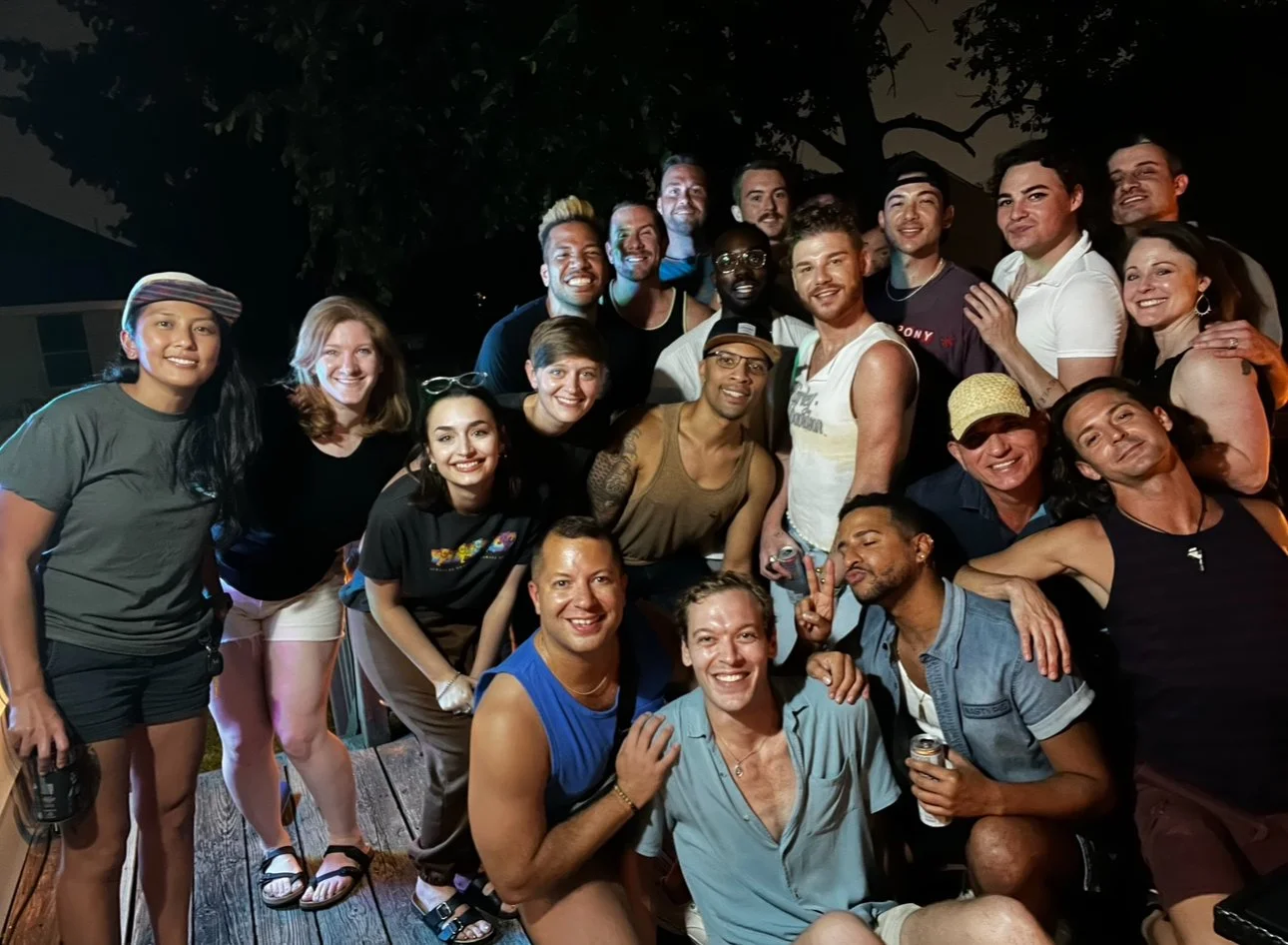Tying up Loose Ends - FAQ | U.S.
“I’m really excited for you. I know you’re going to be in your head, and worried, and scared, and you’re going to question if you have it in you, but I know you do. I know you’re going to follow through, because you’re doing exactly what I did when I came back from visiting Virginia. I was ready to blow up everything in my life, and I did. I started making all the necessary moves. I think it’s going to be awesome and rewarding. Plus you’ve got Kiana there. Knowing I had you here made it less scary.”
-Text message from my sister, Lauren
How did you feel after making the decision to leave the U.S.?
When I got back to Virginia, I felt incredibly refreshed— after getting over the bout of Covid I picked up on the plane ride home, that is. I was inspired to paint again, and I started to work on a new piece; a pair of rose-tinted glasses resting atop a book in the foreground. The background was a still life of the bookshelf in my home and my bicycle. It's based on lyrics from a song by Cage the Elephant called "Telescope." For nearly a decade now, I've referred to this song as "my death song" to people in my life close to me. It's the song I want to play why I die and am buried. Hey— I've never claimed to not be melodramatic.
I focus on the lyrics: "He sits around inside his house, from room to room he moves about, fills his life with pointless things, and wonders what it's all about." After the bridge, Matt Schultz reminds the listener, "Time is like a leaf in the wind; either it's time well spent or time I've wasted, don't waste it."
I spent so many years collecting all of those random knickknacks perched on that shelf. The array of dust-collecting things represented who I wanted to be. I spent many days restless, lingering about my house, moving from room to room, pacing the floors, and staring at my things.

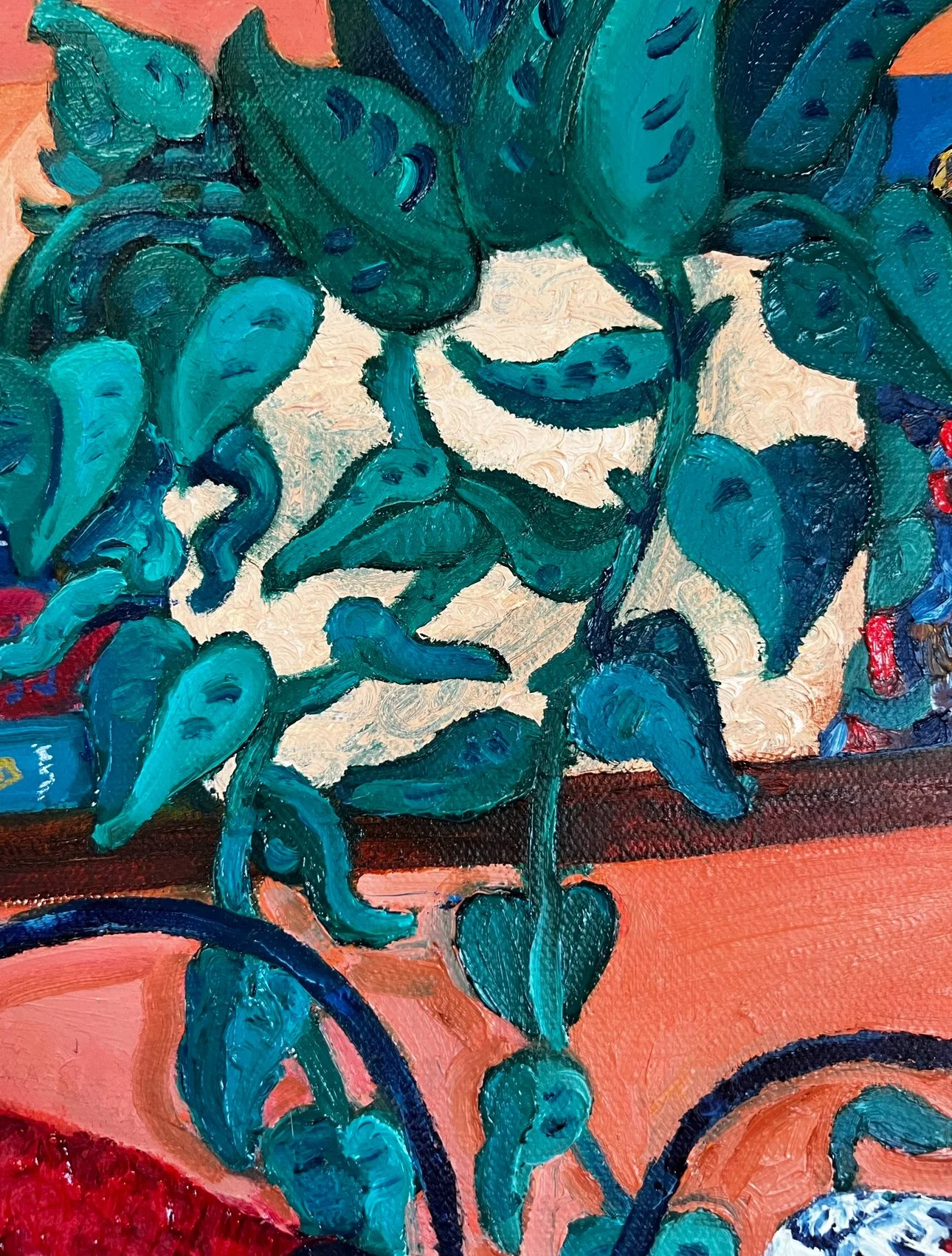
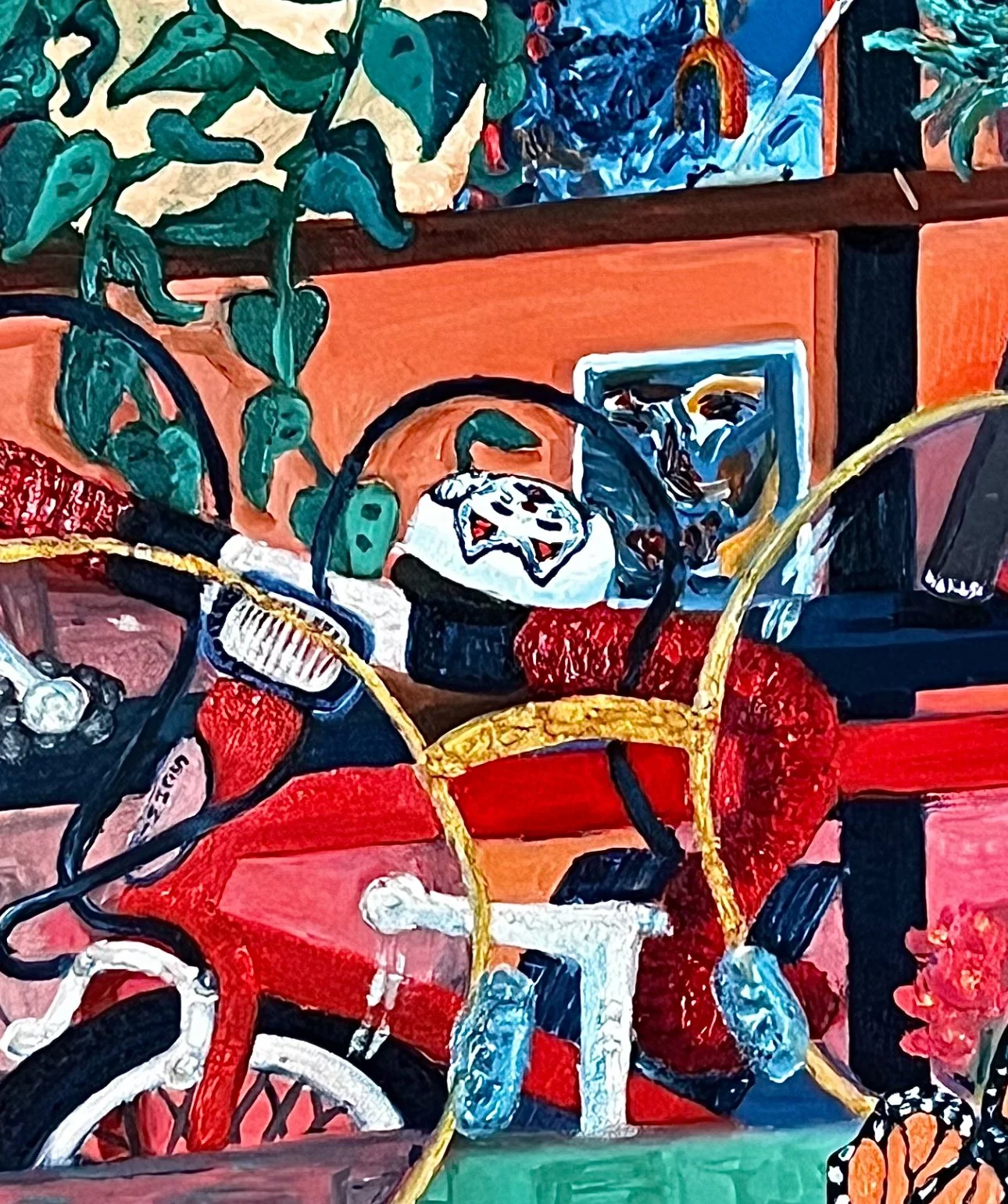
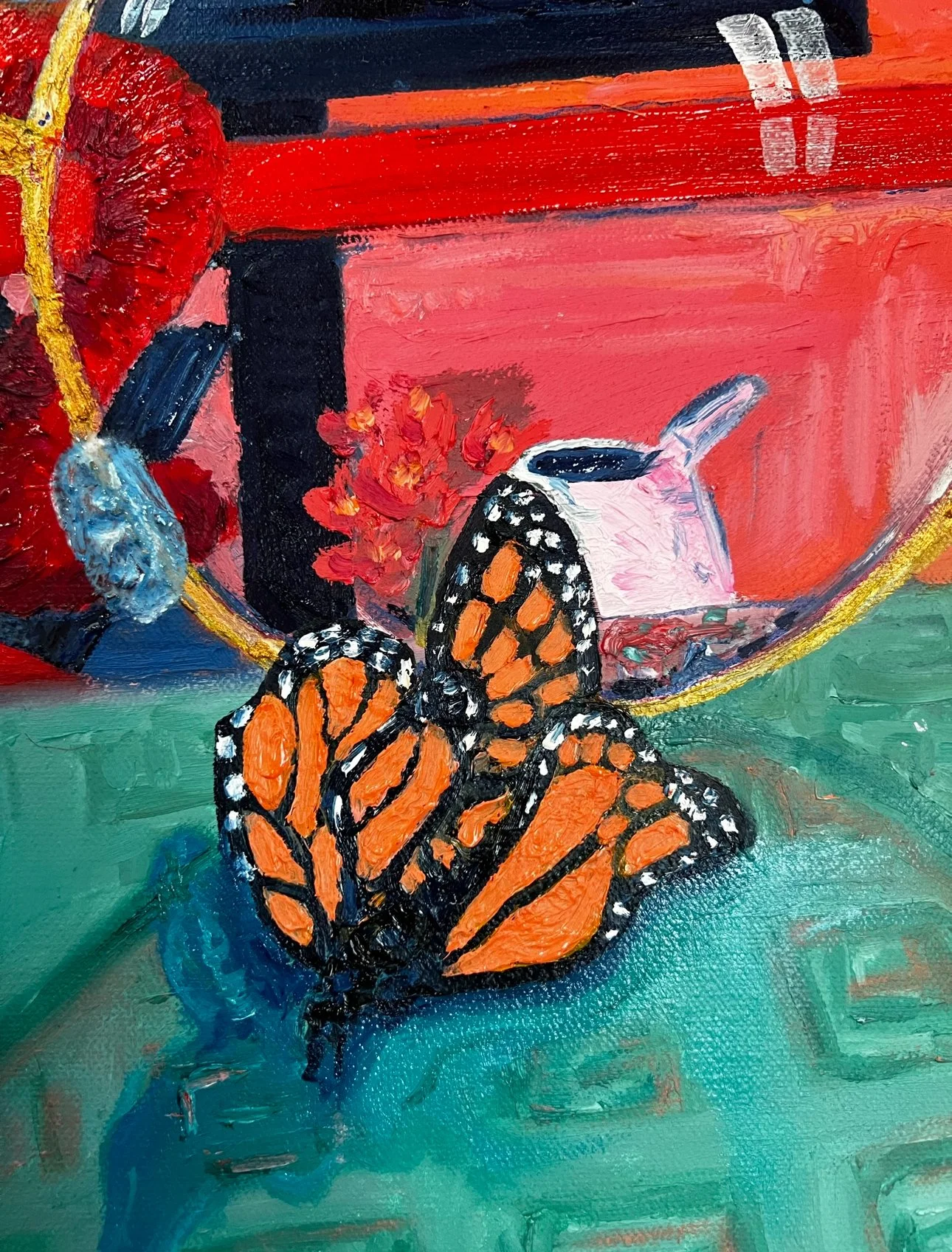
Rose-Colored with detail
Wilson Ahrens, Oil on Canvas, 2023
I am still attached to my things because they feel like a part of me. But I saw this as an opportunity to become the person I imagined I would be as a kid. I only had so much time, and after my recent health issues, I wasn't sure how much time I truly had. I didn't want to waste it.
I cried a lot in those next few months. I think the worst part was leaving my sister. We'd already spent so many years apart. She'd moved to Virginia about two years prior. It felt like we were finally catching up on all the time we lost when I joined the military, and here I was again, leaving.
I felt almost like I was running away from her again, and I felt incredibly guilty about missing out on more time with her. But she talked me down from that. After all, it was 2023. We could talk anytime as if we were in the same room. Oddly, we talk more now than we did when we lived together. Internally, I reconciled those feelings with myself and was feeling incredibly optimistic about the future.
Why Brazil?
Obviously, Kiana heavily influenced my decision to go to Brazil. Still, I have had an affinity for Brazil since I was a kid, which only developed into an obsession after I grew older, met Kiana, and finally visited.
The first chapter book I ever read was a nonfiction book about Rainforests by Mary Pope Osborne, the author of the children's series The Magic Treehouse. I loved frogs, and on the cover was a red-eyed tree frog. I remember pretending to read the words for a year until I was finally literate and could actually understand them. It talked heavily about the Amazon, and Mary Pope Osborne's sixth book in her fiction series was also about the Amazon. The idea of the rainforest filled me with a sense of wonder. I loved animals, and all my favorite ones were in Brazil. That's where it started.
Later, I had a pet, White's Tree Frog, that also drove my obsession. Granted, the Red-Eyed Tree Frog is from Central America, and the White's Tree Frog is from Australia; I didn't know that, but it didn't matter. The biodiversity of the Amazon Rainforest is what primarily drove my interest. So much so that in second grade, I wrote a short story about a boy who went on an adventure down the Amazon River, befriending a monkey and a parrot. I won first place in a writing competition for it. Once I am back home, I can find the original story buried in the boxes in my attic to include in a later blog post.
Then I met Kiana. In middle school, she was one of my first friends after I moved back to my hometown after going away and spending a few years living upstate. Kiana and I lived in the same neighborhood and were best friends in High School—if you've read the blog, you know those stories. If you haven't, what are you doing? Go read it!
Kiana and I back in 2012
Kiana would tell me about where she grew up and what it was like in Brazil. She talked about the farm, and Jarinu. At home, she would speak Portuguese with her dad who would cook Brazilian food at their house. Even Kiana’s mom would sometime speak a bit of Portuguese in her gringo valley girl accent.
Kiana and I would play a game where she would only speak Portuguese, and I'd have to figure out what she was saying. She would either confirm I was on the right track, or point to objects in the room like charades and repeat the words slowly as if that would trigger some idea of what she meant. It often just ended in laughter, but it was a creative and fun way to learn some phrases.
All of this considered, Brazil became an idea in my head, combining my childhood interest with Kiana's friendship. It represented adventure and healing to my inner child and offered me an opportunity to better understand one of my oldest friends.
Isn't Brazil Dangerous?
You could be robbed or attacked anywhere in the world. Still, I would be irresponsible to deny that Brazil poses some threats that are not as commonly encountered in the United States and other ‘Western’ countries. However, Brazil is a diverse country with diverse people. Most Brazilians don't want to cause any harm to anyone. But socio-economic issues, wealth disparity, and corruption put foreigners and even other Brazilians at risk if they are complacent.
I would not discourage travel to Brazil; it's the place I've loved more than any other. However, some common-sense rules should be followed to ensure your safety while you are there, especially in larger cities like Rio de Janeiro and São Paulo. These are the same rules you would apply in some American cities, Detroit or St. Louis for example. That being said, I've also had friends who have been robbed in Barcelona and Los Angeles, so don't let this deter you from seeing what Brazil has to offer. Just follow the rules.
Don't pull out your phone on busy streets. Brazil has a huge import tax on electronics such as the iPhone. The tax is as much as 60-100% of the product's declared value, making it the number one target for thieves. It is common enough that many people carry what they call a "thieves phone." A secondary beater phone to hand over to robbers. On a week-long vacation, it's not very likely to happen to you. Still, I wouldn't go waving my cell phone around on Avenida Paulista. Tuck your cellphone in the front of your pants, and only carry necessary items from your wallet, such as your credit card, ID, and some cash.
Don't wear flashy clothing and expensive jewelry. You don't need it, and you're making yourself a target. Don't wear the smart watch. Or really any watch for that matter, unless its a Casio from 1998. I personally don't dress up at all. If you want to wear your Zara and look hot, that is your prerogative, I don't even wear new-looking named brands like Nike or Polo.
Don't walk the streets at night in big cities, especially alone. Always take the Uber— not some random taxi, an Uber. You may move from one bar to another on foot with a group in nightlife areas. This is typically fine until a certain hour. You should be fine if you are bar hopping with friends before midnight in the Pinheiros, Vila Madalena, or Rua Augusta and Praça Roosevelt.
Is it likely you will be robbed in the first place? If you stick to the rules and tourist areas, probably not. Millions of people go to Brazil as tourists every year, and millions leave with everything they came with. A couple thousand get robbed. The longer you are there and the more complacent you are, the more of a reality that becomes. Speaking from experience on this one.
What did you do to prepare for Brazil?
When I got home, I was in full blow-up-my-life mode. At the time, I was attending Old Dominion University, majoring in Computer Science. My courses included Computer Architecture, Programming and Problem Solving, and Calculus II. However, Computer Science wasn't going to help me fulfill the needs of the non-profit, so I started changing my major to Business Management courses. This was my first important step. Setting things in motion kept me motivated to continue pushing towards my goal, this is true for anything you’d like to accomplish. Take action.
I started spring cleaning like a pregnant woman nesting. I realized the sheer amount of belongings I had; clothes I hadn't worn in years and miscellaneous household items that typically accumulate with someone who has settled into a home. I started to systematically thin out my belongings. I sold paintings I had been storing in the spare bedroom, put large swaths of my wardrobe up for consignment, and donated the rest. I began showing my sister what I did around the home to maintain it, as she and her wife would take over while I was gone.
I started researching São Paulo, including the best neighborhoods to live in, areas to avoid, LGBTQ+ friendly areas, phone providers, transportation, and the cost of living. I reached out to people I'd met for resources and set up a network of friends to meet when I arrived. I started to practice my Portuguese and learned basic phrases so that I would be able to function.
Preparing to quit my job and tell my friends was the most intimidating part for me. This made it all feel real. I mean, it was. I had already purchased the plane ticket and had a rental agreement lined up for the first three months, but that was refundable. Pulling this trigger was the point of no return. I withheld telling my friends and officially submitting my resignation until a month before my departure date.
My friends and even my boss were incredibly supportive. I was overwhelmed with the positivity I received. It made me feel like my decision was the direction I was meant to take. Clocking out of work for the last time a week before I took off felt like a weight had been lifted from my shoulders. I invited all of my friends over for a goodbye celebration. It made me sad in a way. To see all the faces I'd built my life around for the last six years. It was a bittersweet feeling, but I knew I would be back.
A group photo from my going away party, July 2023.
Why did you go to Europe? What happened? How did you adapt to those changes?
I was incredibly naive going into this journey. It is much harder to leave your country and stay in another country for longer than a few months than I realized it would be. Especially because Women and the Wind is a start-up non-profit organization, we aren't a registered entity in Brazil; we are registered in the United States, so the Ministry of Exterior Relations and Immigration didn't see much of a reason I would need to move to Brazil for my work.
The reason I was moving there was, in reality, multifaceted. Officially, my primary purpose was to work in close proximity with Kiana and develop relations in Brazil. Unofficially, it was a journey of self-discovery for me. And unfortunately, working near your friend and self-discovery aren't convincing arguments for most world governments. I could only secure six months in Brazil instead of the planned one year. This left me scrambling for options. Do I go to Uruguay and Argentina for a couple of months? Do I go home? That didn't feel acceptable to me.
I decided I wanted to keep learning Portuguese, which is when the idea to spend some time in Portugal developed. That turned into a six-month stint traveling Europe. I would spend some time around Portugal, Italy, and France. It may seem like I was flying by the seat of my pants, but that's because I was.
This was all new to me, but I've had my life and general plans scheduled for the last year at least four months ahead. I learned a lot about being adaptable and not overreacting to minor inconveniences. I've also learned a lot about myself, my anxiety, and how I react to problems. Along the way, I met some amazing people, and got to see lots of old friends as well.

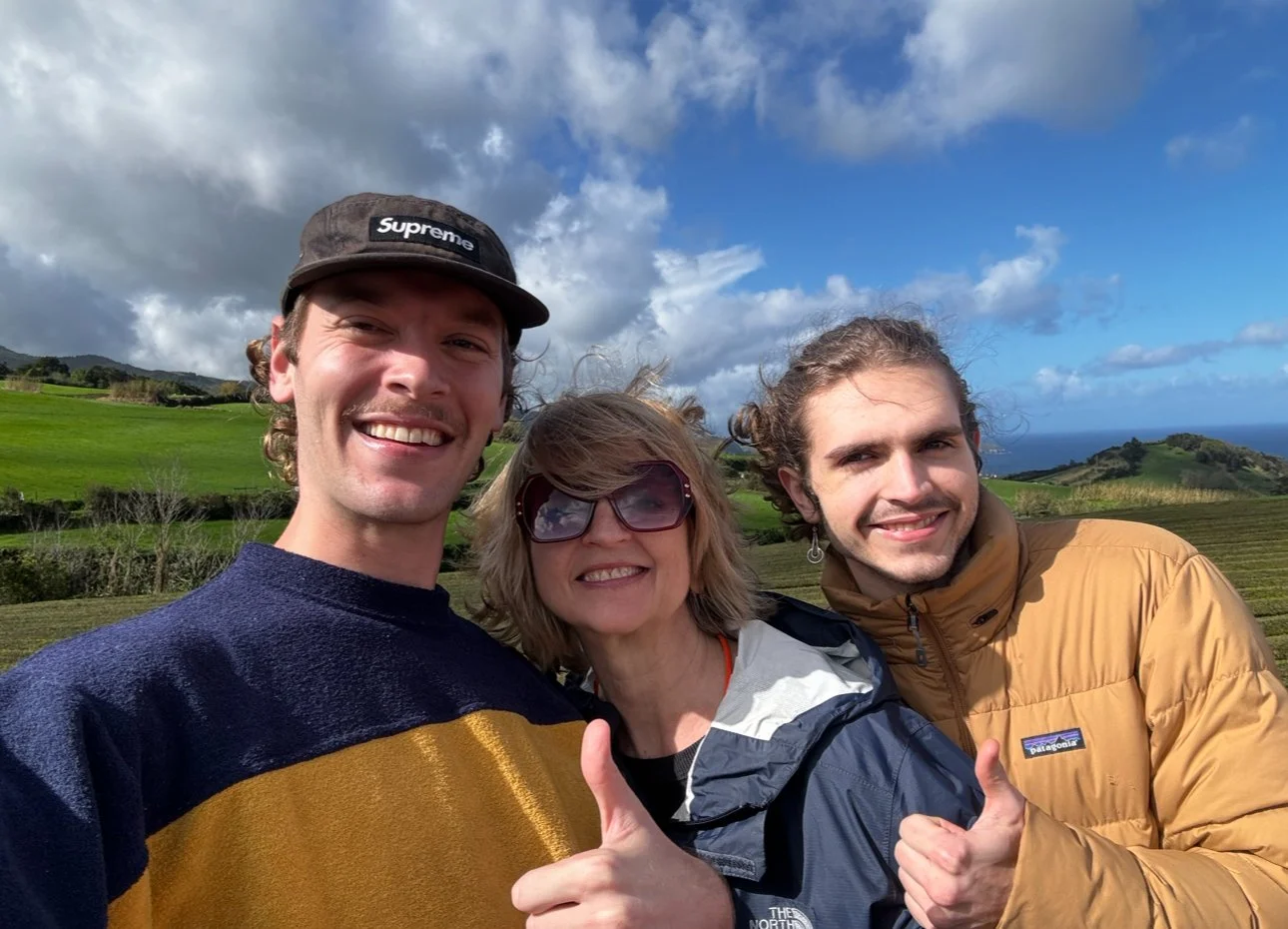







Old friends and new friends in Europe 2024.
During my planning phase for Europe I found out about the Schengen Zone. Most of Western Europe makes up this zone and shares visa requirements. Any time spent in any Schengen Zone country counts toward your allowed stay time in every other member country.
As Americans, we have three months before we must leave the Schengen Area. I spent time in Portugal, France, and Italy. My clock was ticking, and I had to devise a plan to leave Schengen. I settled on Turkey and Montenegro for three months to reset my clock. All of that will be discussed in more detail later in the blog.
After I saw the limited time I had to spend visiting such a vast area of Europe, I wanted a way to access more of it for longer. I had the idea to apply for a Portuguese Visa so that I could continue learning Portuguese long term and also live and work in Europe. So, I started that process.
Initially, I wanted to return to Western Europe after Turkey and Montenegro. However, acknowledging that I would most likely be getting a Portuguese Visa, I figured I would have plenty of time to experience Europe in the near future. I missed Brazil too much. So, instead of going back to Western Europe, I decided to return to Brazil in July 2024 and should have a Portuguese Visa in early 2025.
To maintain the visa, I must stay in Portugal for six months out of each year, and I intend to split the rest of that time between the United States, Brazil, and the rest of Europe.
Do you have any tips for people wanting to long-term solo travel?
Income:
First and foremost, you need a source of income, and that need can vary wildly depending on the style of travel you intend on. Backpacking, couch surfing, and informal work are much cheaper but come with less stability. A more stable lifestyle will almost certainly require formal remote work unless you are already an influencer or are gainfully self-employed.
Some professions are easily adaptable to lifestyles, such as programming or data science. However, if you don't work in a primarily computer-based profession, it could take a years-long transition, including schooling and job searching, to achieve this.
If you are inclined to computer science, 12-week coding boot camps exist that can get you up to speed relatively quickly, but these should be researched thoroughly. Go with a well-reputed one. There are so many different ones for different programming, that I cannot give a recommendation, but narrow down what you’d like to specialize in, find a well-reviewed and highly rated one within your budget, and remember that if it looks too good to be true, it probably is.
Volunteering for non-profit organizations or teaching English are also viable ways to get into long-term nomadic travel. To teach English abroad, you must take a 10-12-week TEFL certification. The gold standard for TEFL is called the CELTA, offered by Cambridge University. These are just a few recommendations, but anyway you can earn a remote or passive income is a solution for this need.
Planning:
Thoroughly research destinations beforehand and take local recommendations about safety when given. In online communities, I always see people looking for advice because they've gotten in over their heads. Like anything else, some things are just meant for more experienced people. I was more naive than I should have been when I first visited Brazil. It is not typical the place people dive headfirst into. Amongst long-term travelers, Brazil is not considered amateur hour. I was blithely unaware of that when I went. But I learn quickly, even if I have to learn the hard way. All in all, the experience made me a stronger, more resilient person.
An even more intense example I saw recently was a post from a Canadian girl who started her journey in South Africa in Johannesburg. She was back on the plane home within 48 hours. Johannesburg is a place not even the most experienced, rough-it-style solo travelers spend much time in. Most responses to her post echoed the sentiment that she should have done more research. Still, she likely could have safely continued her trip along South Africa's Garden Route instead of flying home. However, she was right to have left Johannesburg immediately. It shows that with some planning, she could've avoided the expensive life lesson and continued her trip with a fulfilling experience. Lucky me, I had both a costly lesson and a fulfilling life experience. More on that in my return to Brazil.
Community:
Online communities are incredibly valuable resources; join them! I am in several sub-Reddits, Facebook groups, and Forums dedicated to nomadic, long-term, and solo travel. The beauty of living in 2024 is that we have the entire collective human experience available in the palms of our hands. You don't have to learn that expensive lesson or wander around the city looking for authentic cuisine. Someone already did the work for you. Skip Yelp and go to the message boards.
These groups are also awesome for meeting people in the cities you visit. They can offer a sense of belonging during a time when you may feel out of place and give you the chance to meet like-minded individuals. I've met several people in these groups, and every person has been a wonderful connection with interesting stories and valuable insight.
Thrift:
I save money in every way I can. The primary way I do that every day is with an airline credit card, and you don’t need to be nomadic for this. Choose a card that has no international transaction fees. This feature alone has saved me hundreds of dollars over the last year. I make all my purchases and pay my bills with the card, completely paying it off each month. I rack up tons of airline points for free flights, if you aren’t nomadic, congrats, that’s a free flight for your next vacation.
I do have to pay for some flights to more niche places out of pocket, but I look at this as paying it forward with the free flight I will get later. To minimize these expenses, I always book my flights months in advance and compare dates for the lowest airfare. I schedule my stay around departure and arrival dates.
This is common sense but avoid tourist places. I will go see the highlights, but I have never found it worthwhile to linger in their shadow and waste my money. I am sure some people see the allure of eating at a cafe with the perfect view of the Eiffel Tower. I don't. I would rather buy a bottle of wine and some croissants for five euros fifty at a convenience store and enjoy them in the park on a blanket. I get my little memory and save an arm and a leg.
On the topic of food, the two cheapest options are always the best, cook for yourself or follow the locals. In my experience, the cafe full of tourists is sure to be overpriced, inauthentic, and of subpar quality. The rundown joint with old mustached men smoking cigarettes out front is going to be half the price and twice as good. Order something you normally wouldn't every once in a while.
Try thrift shopping everywhere you go for a few other good ways to save. Some cities have fantastic thrift scenes. My best finds have been in São Paulo, Lisbon, and Rome. Thrifting in these places is way cheaper than in the U.S. in most cases. It's kept me with a fresh wardrobe as many of my clothes have worn out after hard use while traveling. Another no-brainer is to learn to use public transportation systems. Most places have vastly more robust public transport than we are used to in the States, and once you know how to use one, you can pretty much navigate them all.
Perspective:
Go into every experience with an open mind. Realize that you are a product of your upbringing, and while you are allowed to stand by your stances, at least look for understanding in the person you are confronted with. The same person may not be looking for understanding in you, which is okay. It's not about them. It's about you growing as a person; they may be at a different point in their journey.
One instance of this is that students learn different continent models in other parts of the world. In the United States, we learn that there are seven continents. In most of South America, they learn that there are six continents and North and South America are one. The five Olympic rings represent the Five Continent Model.
But this difference between North and South American education systems can spark petty disagreements that bring up sentiments of socio-economic issues and U.S. foreign policy injustices. If you are unaware, the U.S. supported a 1964 coup that installed a dictatorship in Brazil for 21 years until 1985. Throughout the dictatorship, the U.S. helped support the imprisonment of more that 400,000 political prisoners, and the murder of as many as 60,000. Some can view this seven continent model as Americans trying to distinguish themselves from South Americans— as somehow better, despite their intertwined and dark history.
I don’t think that’s what goes through any of our heads when we say there are seven continents. To me it seems like a simple geographical definition of North and South based on the equator, a consequence of plate tectonics, or the fact that there is a tiny little isthmus between us.
However, this is about understanding the past and its effects on the present. I’ll bet if you are an American reading this, you had no idea that the United States did any of that. This is the sort of understanding of others' perceptions and their culture that can help avoid some uncomfortable social faux pas, and educate you on why they exist in the first place.
Some cultural differences are handed down over time, and that’s just what we do. For instance in some countries, you're expected to greet shop owners first. They see it like walking into someone's home without greeting the owner. Germans see Americans' tendency to avoid eye contact when it is made on the street as shifty. And Americans often think Germans are staring at them. Many Eastern Europeans, as well as some Eastern Asians, are very honest in a way that is offensive to Americans, but within their culture, they are not considered rude; in fact, beating around the bush and sugarcoating your feelings are seen as dishonest and inauthentic.
This is not to say that you should change your behaviors to satisfy everyone you meet. As I said, you are a product of your experiences, but cultural awareness can help to avoid many unnecessary conflicts. Whoever you're dealing with may be ignorant about your culture; again, it's not about them. By asking questions and learning, you can control the situation, gain perspective about the world, and have a richer experience. And, hey, maybe you'll decide they're an asshole later. That's okay, too. Some people's experiences are too different from our own to overcome.
Final Thoughts
This blog post is meant to answer frequently asked questions from readers and friends about the past and present, bridge the gap between my first trip to Brazil and the final move, and give insight into how I view my experiences so far. Some have also asked for advice on how they can switch up their lifestyle. Let me know if you’re interested in seeing more of this blog post style, and I will sprinkle more of these throughout the blog. Feel free to drop support or questions about me or the blog in the comments— or reach out to me via the contact me form or my linked socials.
Next Post
The next series of posts will cover my six months in São Paulo. A story of psychedelic mushroom trips and insane nightclubs on the top floors of abandoned skyscrapers. I befriend performers in erotic cabarets and spend quiet nights onboard Kiana’s boat. I finally meet the other members of Women and the Wind, Alizé Jireh and Laerke Heilmann as we explore the Atlantic forests once again, encountering heaps of exotic wildlife. I also get robbed on the street by a gang of fifteen. It should be interesting, so keep an eye out for the next post.

